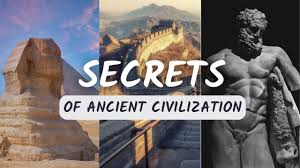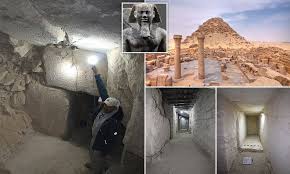 |
| The Hidden Secrets of Ancient Civilizations Revealed |
Ancient civilizations have always fascinated us. Their achievements, mysteries, and legacies offer a window into our own past. But what if there are hidden secrets that we’ve yet to uncover? This article delves into the lesser-known aspects of ancient civilizations, shedding light on the incredible innovations and enigmatic practices that shaped the world as we know it.
Unveiling Technological Marvels
Many ancient civilizations were remarkably advanced in technology and engineering. The Egyptians, for instance, are renowned for their monumental pyramids. These structures were built with precision that baffles modern engineers. Did you know that the Great Pyramid of Giza was aligned with true north? This alignment showcases their advanced understanding of astronomy and mathematics.
The Mayans, another remarkable civilization, excelled in the field of astronomy. They created detailed calendars and had an intricate knowledge of celestial bodies. Their architectural prowess is also evident in their towering pyramids and temples, which were designed to align with astronomical events.
Cultural Riches Beyond Imagination
Ancient civilizations were also rich in culture and art. The Greeks, for instance, contributed immensely to philosophy, theatre, and the arts. Their philosophers, such as Socrates, Plato, and Aristotle, laid the groundwork for Western thought. Greek tragedies and comedies are still performed today, reflecting timeless human themes and emotions.
In the Far East, the Chinese civilization made groundbreaking contributions to art, literature, and science. The invention of paper, gunpowder, and the compass were revolutionary. These innovations spread across the world, fundamentally altering global development.
Mysteries That Still Puzzle Us
Despite our extensive knowledge, many aspects of ancient civilizations remain shrouded in mystery. The disappearance of the Indus Valley civilization is one such enigma. This advanced society, which flourished around 2500 BCE in what is now Pakistan and northwest India, had sophisticated urban planning and impressive infrastructure. Yet, it vanished suddenly, leaving behind no clear explanation.
Similarly, the purpose of the Nazca Lines in Peru continues to baffle researchers. These large geoglyphs, etched into the desert floor, depict various animals and shapes. Some theories suggest they were astronomical calendars, while others propose they were created for ceremonial or religious purposes.
Ancient Medicine and Healing Practices
The medical knowledge of ancient civilizations was surprisingly advanced. The Egyptians, for instance, practiced surgery, dentistry, and even had knowledge of prosthetics. Their medical papyri reveal detailed treatments for various ailments, showcasing a blend of practical and spiritual healing.
In India, Ayurvedic medicine, which dates back over 3,000 years, focused on holistic health. It emphasized the balance of mind, body, and spirit, and used natural remedies, yoga, and meditation. This approach to health and wellness is still popular today, reflecting its enduring efficacy.
Environmental Impact and Sustainability
Many ancient civilizations were keenly aware of their environment and practiced sustainable living. The Incas, for example, developed terraced farming techniques that maximized arable land in the Andes Mountains. This method prevented soil erosion and managed water resources efficiently, supporting large populations in otherwise inhospitable terrain.
The Mesopotamians, who inhabited the fertile crescent, practiced irrigation to enhance agricultural productivity. Their innovations in water management laid the foundation for modern farming techniques, demonstrating an early understanding of environmental stewardship.
The Legacy of Ancient Civilizations
The legacies of ancient civilizations are all around us. Our legal systems, languages, architectural styles, and even everyday objects have roots in these ancient societies. Roman law, for instance, has influenced legal systems worldwide. The Latin language, from which many modern languages evolved, was the lingua franca of the Roman Empire.
Architectural marvels, such as the Parthenon in Greece and the Colosseum in Rome, continue to inspire modern design. These structures are not only beautiful but also embody the engineering genius of their creators.
Conclusion
The hidden secrets of ancient civilizations reveal a tapestry of innovation, culture, and mystery. By exploring their technological marvels, cultural riches, and enduring legacies, we gain a deeper appreciation of our shared human heritage. The enigmas that remain challenge us to continue exploring and learning from the past.
FAQs
1. What are some of the technological advancements of ancient civilizations?
Ancient civilizations like the Egyptians and Mayans had advanced understanding of astronomy, mathematics, and engineering, evident in structures like the pyramids and temples aligned with celestial events.
2. How did ancient civilizations contribute to modern culture?
Greek philosophers laid the groundwork for Western thought, while Chinese inventions like paper and gunpowder revolutionized global development.
3. What mysteries of ancient civilizations remain unsolved?
The sudden disappearance of the Indus Valley civilization and the purpose of the Nazca Lines in Peru are among the enduring mysteries that continue to intrigue researchers.
4. How did ancient civilizations approach medicine and healing?
Egyptians practiced surgery and dentistry, while Ayurvedic medicine in India emphasized holistic health with natural remedies, yoga, and meditation.
5. What can we learn from the environmental practices of ancient civilizations?
Civilizations like the Incas and Mesopotamians developed sustainable farming techniques and water management systems, demonstrating an early understanding of environmental stewardship.



